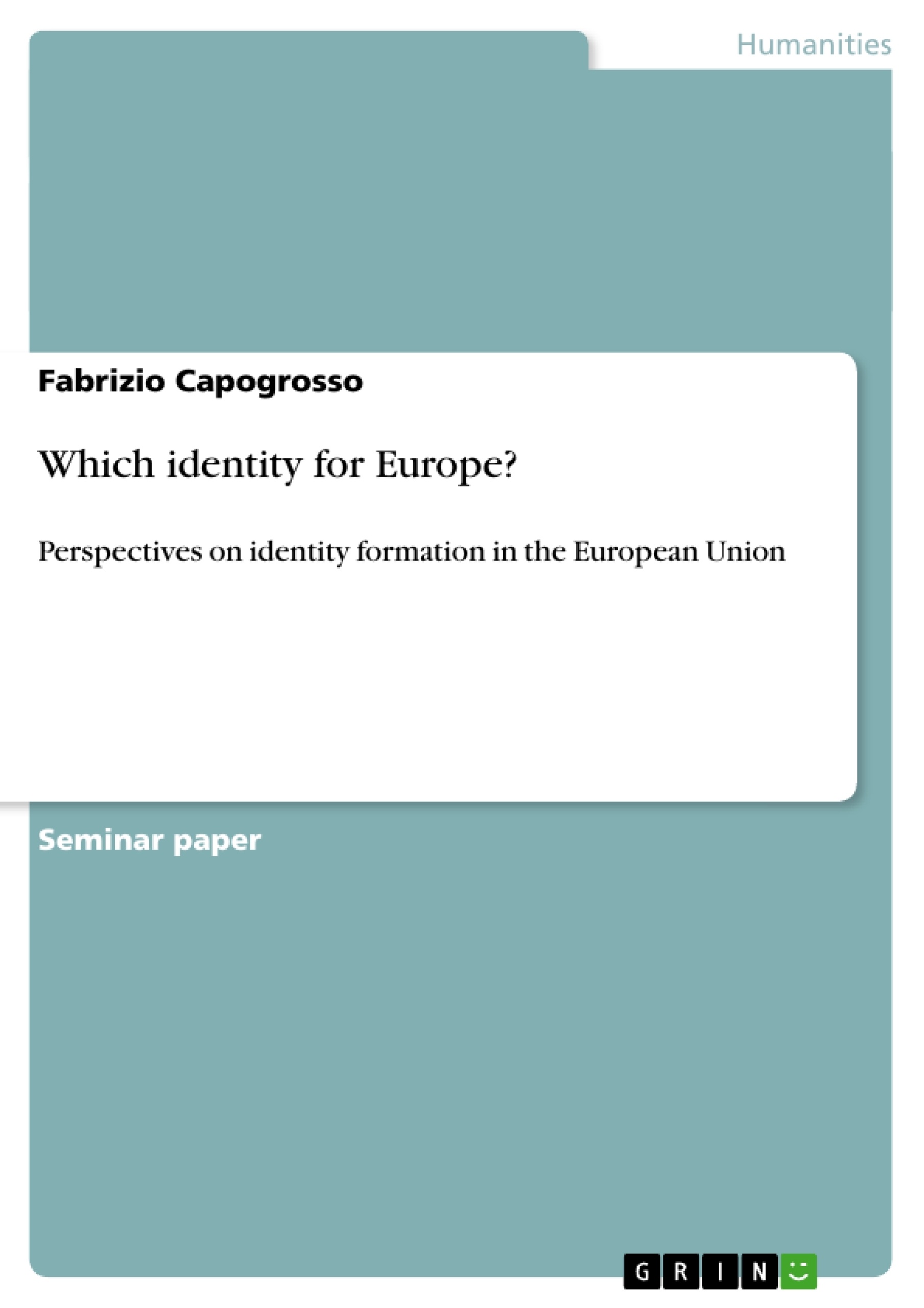In the last decades, debates about the existence and the meaning of an European idetity raised all the time more. Some scholars approached the theme, focussing on a “common historical heritage”, which points to a basis for a collective identity (Habermas 2001; Giesen 2003), others based their arguments on political and institutional similarities among European countries like human rights protection, democracy and rule of law (Risse 2001). In other cases, the studies on the topic focussed on the ambivalent employ of the term “identity”, arguing its (ab)-use, above all in EU-Treaties, instead of more obviously expressions as “legitimacy” or “sovereignty” (Bruha/ Rau 2000).
The aim of this paper is to examine the topic from two distinctive perspectives: a post-national and a postmodern. The paper suggests a sort of “back to the roots” of the en-quiry, approaching the subject neither with pre-existent assumptions nor with the goal to order puzzled arguments. The study will not pursue the question about the existence of a collective European identity, but will search for possible ways and circumstances, in which “identity” in Europe (restricting the focus on the European Union) may emerge.
The central question of the paper will be if the development of an European identity is plausible and if a widespread process of socialisation may prevail on the national structures of the member states (hereafter MSs) and lead to the growth of common “procedures” and “functions” among European populations. In order to answer the question the more satisfactory as possible, the dissertation proposes two differing angles for the analysis with the intend to compare the findings resulting from dissimilar criteria of examination.
In a first part the EU will be considered as a post-national political order, deriving from the dissolution of its MSs. After a short explanation on the political nature of the Union from this standpoint, the dissertation will explore the option of an emerging post-national identity in the European Union, adopting the criteria proposed by Anthony Smith in his study of national identities (Smith 1991). The analysis will evaluate if the EU attends the proposed criteria in order to assess the coming out of a post-national form of social identification. [...]
Inhaltsverzeichnis (Table of Contents)
- Introduction
- Mapping the formation of identity: structures, aspects and dimensions
- The post-national perspective
- The European Union as a post-national form of state
- Post-national identity formation: setting criteria for the analysis
- Evaluating the criteria
- Does the EU possess a “collective” proper name?
- Can the EU rely on a myth of common ancestry?
- Does Europeans share an historical memory?
- Are there elements of an European common culture?
- Is there an European homeland?
- Does solidarity unify Europeans?
- Preliminary conclusions
- The Postmodern perspective
- The European Union as a postmodern form of state
- Which criteria for a postmodern identity formation?
- How to investigate identity in a postmodern Europe?
- How to characterize European identity from a postmodern standpoint?
Zielsetzung und Themenschwerpunkte (Objectives and Key Themes)
This paper examines the emergence of a European identity from two perspectives: post-national and postmodern. It avoids pre-existing assumptions and instead explores the plausibility of a widespread socialization process overcoming national structures within the European Union (EU) to create common procedures and functions among European populations. The study doesn't focus on the existence of a collective European identity, but rather on the conditions under which such an identity might emerge.
- The plausibility of a developing European identity.
- Analysis of the EU as a post-national political order.
- Examination of the EU through a postmodern lens.
- The role of socialization, procedures, and functions in identity formation.
- The concept of "sovereignty" in the context of EU integration.
Zusammenfassung der Kapitel (Chapter Summaries)
Introduction: This chapter introduces the ongoing debate about European identity, highlighting various scholarly approaches and outlining the paper's aim to investigate the conditions for the emergence of a European identity from post-national and postmodern perspectives. It poses the central question of whether the development of a European identity is plausible and whether a process of socialization can lead to common procedures and functions across member states.
Mapping the formation of identity: structures, aspects and dimensions: This chapter explores the theoretical frameworks for analyzing identity formation, focusing on psychodynamic and sociological approaches. It examines identity as a process of distinguishing self from other, involving inclusive and exclusive structures operating within temporal and spatial dimensions. The chapter introduces Utzinger's threefold process of identity formation: socialization, procedures, and functions.
The post-national perspective: This section begins by framing the European Union as a post-national entity, discussing its political nature and the concept of sovereignty. It then analyzes whether the EU meets the criteria for a post-national identity, using Anthony Smith's framework for national identities as a benchmark.
Frequently Asked Questions
Can a collective European identity exist?
The paper examines this not as a pre-existing fact, but searches for the conditions and circumstances under which such an identity might emerge within the EU.
What is the post-national perspective on EU identity?
It views the EU as a political order emerging from the dissolution of traditional nation-states, potentially leading to a post-national form of social identification.
What criteria define a national identity according to Anthony Smith?
Criteria include a collective proper name, a myth of common ancestry, shared historical memories, a common culture, a homeland, and unified solidarity.
How does the postmodern perspective differ?
The postmodern standpoint investigates identity as a fluid, non-linear process characterized by multiple procedures and functions rather than rigid historical structures.
Does the EU share a "common culture"?
The analysis evaluates if institutional similarities like human rights and democracy can serve as a sufficient basis for a shared European cultural memory.
- Citar trabajo
- M.A. Fabrizio Capogrosso (Autor), 2008, Which identity for Europe?, Múnich, GRIN Verlag, https://www.grin.com/document/121624



